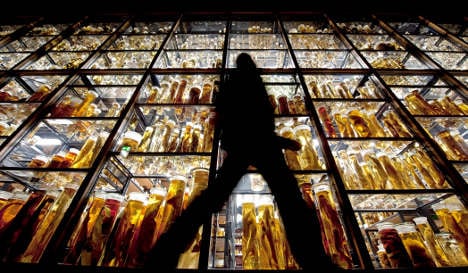The stately museum, home to some 30 million objects, among them the largest mounted dinosaur skeleton in the world, has curated special selections from its massive collection to highlight two centuries of developments in natural history.
For the exhibition, entitled Klasse, Ordnung, Art, or “Class, order, species,” the museum turns the magnifying glass back on itself, exploring the evolution of natural history itself, the changing ideas of collection strategies, and how the country’s political history has coloured this past.
“We have a lot of curiosities here,” head of exhibitions Prof. Dr. Ferdinand Damaschun said during a press tour on Monday, pointing to stuffed Vasa parrot “Jacob,” the long-time pet of museum founder Alexander von Humboldt.
CLICK HERE FOR PHOTOS OF THE EXHIBITION.
According to Damaschun, each day an ageing Humboldt would ask the parrot, which could speak a bit, which of the two would outlive the other.
“In the end Jacob won, but when he died a few months later taxidermists found out that he should have been called Jacobina,” Damaschun said.
Many treasures and oddities like the stuffed bird, collected by researchers around the world, will be exhibited for the first time in the show. Among them are exquisitely iridescent blown-glass models of jelly fish, a beautifully-penned 16th-Century specimen log book, and museum director Reinhold Lienfelder’s personal favourite, a remarkable a sea foam-coloured antique cabinet full of rare corals.
While many of the pieces embody a strange beauty, others don’t shy from what exhibition curator Damaschun called the “dark parts of history.”
One example: A gentle-eyed giant panda that Nazi Luftwaffe commander Hermann Göring (who also happened to be the Third Reich’s Jägermeister) had stuffed for a 1935 international hunting exhibition in Berlin.
“Animals that are now under the strictest of protections were at one time trophies,” Damaschun explained. “We don’t know how it came into the collection, but we put it in the exhibition to show the difficulties the museum has had during different eras.”
The anniversary of one of Berlin’s oldest museums also means a first glimpse of the newly rebuilt east wing, which now holds the institution’s impressive “wet collection” of about one million zoological specimens preserved in large glass vials.
Hit by Allied bombs in 1945, the east wing of the Museum für Naturkunde, holding the entomological collection at the time, was heavily damaged. But the €29.6-million renovations have created optimal conservation and fire-protection conditions for the specimens, which swim in some 80-tonnes of alcohol.
The museum’s half-million visitors per year, along with scores of researchers who come from around the world, can now view and investigate some 270,000 specimens of fish, snakes, snails, frogs and other animals collected over the years.
The massive new room, full from floor to ceiling with the illuminated jars of pickled creatures, is undoubtedly the highlight of the museum’s anniversary celebration – but there will be many more events throughout the month of September, including concerts, special tours, children’s theatre and more.
The new exhibition Klasse, Ordnung, Art is open September 14 to February 28.



 Please whitelist us to continue reading.
Please whitelist us to continue reading.
Member comments